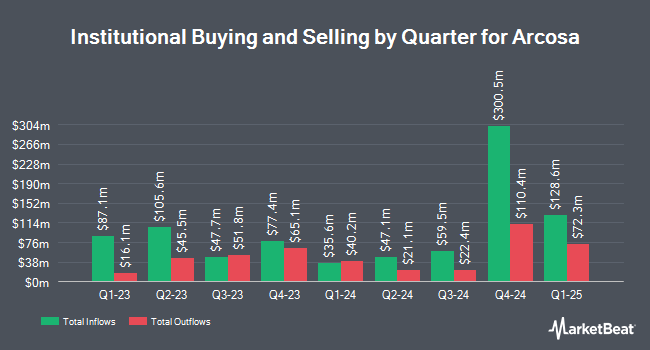Victory Capital Management Inc. boosted its stake in shares of Arcosa, Inc. (NYSE:ACA - Free Report) by 385.5% in the fourth quarter, according to the company in its most recent Form 13F filing with the Securities and Exchange Commission (SEC). The firm owned 76,145 shares of the company's stock after purchasing an additional 60,460 shares during the quarter. Victory Capital Management Inc. owned about 0.16% of Arcosa worth $7,366,000 at the end of the most recent reporting period.
A number of other hedge funds and other institutional investors have also recently added to or reduced their stakes in ACA. KBC Group NV boosted its position in shares of Arcosa by 20.5% in the third quarter. KBC Group NV now owns 1,424 shares of the company's stock valued at $135,000 after acquiring an additional 242 shares during the period. Natixis Advisors LLC boosted its position in shares of Arcosa by 8.2% in the third quarter. Natixis Advisors LLC now owns 39,692 shares of the company's stock valued at $3,761,000 after acquiring an additional 3,013 shares during the period. Sawgrass Asset Management LLC bought a new stake in shares of Arcosa in the third quarter valued at about $215,000. Thrivent Financial for Lutherans boosted its position in shares of Arcosa by 10.7% in the third quarter. Thrivent Financial for Lutherans now owns 72,387 shares of the company's stock valued at $6,859,000 after acquiring an additional 6,992 shares during the period. Finally, Advisors Asset Management Inc. boosted its position in shares of Arcosa by 5.3% in the third quarter. Advisors Asset Management Inc. now owns 38,445 shares of the company's stock valued at $3,643,000 after acquiring an additional 1,944 shares during the period. 90.66% of the stock is owned by institutional investors.
Analyst Upgrades and Downgrades
Separately, Oppenheimer boosted their price target on Arcosa from $105.00 to $110.00 and gave the company an "outperform" rating in a research note on Tuesday, January 14th.
Get Our Latest Report on ACA
Arcosa Trading Down 1.2 %
Shares of Arcosa stock traded down $0.97 on Tuesday, hitting $80.27. The stock had a trading volume of 227,441 shares, compared to its average volume of 241,356. The stock has a 50 day moving average of $93.97 and a 200 day moving average of $96.51. Arcosa, Inc. has a twelve month low of $72.75 and a twelve month high of $113.43. The company has a debt-to-equity ratio of 0.51, a quick ratio of 2.77 and a current ratio of 3.61. The firm has a market capitalization of $3.92 billion, a P/E ratio of 30.52 and a beta of 0.81.
Arcosa Dividend Announcement
The company also recently disclosed a quarterly dividend, which will be paid on Wednesday, April 30th. Stockholders of record on Tuesday, April 15th will be paid a $0.05 dividend. This represents a $0.20 annualized dividend and a dividend yield of 0.25%. The ex-dividend date of this dividend is Tuesday, April 15th. Arcosa's dividend payout ratio is currently 10.47%.
Arcosa Company Profile
(
Free Report)
Arcosa, Inc, together with its subsidiaries, provides infrastructure-related products and solutions for the construction, engineered structures, and transportation markets in the United States. It operates through three segments: Construction Products, Engineered Structures, and Transportation Products.
Featured Stories

Before you consider Arcosa, you'll want to hear this.
MarketBeat keeps track of Wall Street's top-rated and best performing research analysts and the stocks they recommend to their clients on a daily basis. MarketBeat has identified the five stocks that top analysts are quietly whispering to their clients to buy now before the broader market catches on... and Arcosa wasn't on the list.
While Arcosa currently has a Buy rating among analysts, top-rated analysts believe these five stocks are better buys.
View The Five Stocks Here
Almost everyone loves strong dividend-paying stocks, but high yields can signal danger. Discover 20 high-yield dividend stocks paying an unsustainably large percentage of their earnings. Enter your email to get this report and avoid a high-yield dividend trap.
Get This Free Report
Like this article? Share it with a colleague.
Link copied to clipboard.